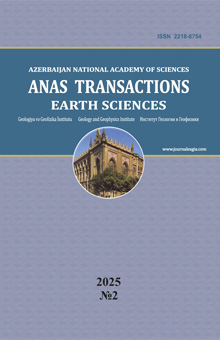Artificial intelligence (AI) evaluation of current reservoir pressure distribution based on oil production data
Suleimanov B.А., Huseynova N.I.
OilGasScientificResearchProject Institute, SOCAR, Azerbaijan AZ1012, Baku, Zardabi ave., 88A
DOI: 10.33677/ggianas20240100117
Summary
The paper investigates a quick-look approach for the assessment of the distribution of current reservoir pressure based on production data. The method is based on an algorithm that includes calculation of the current distribution of values of stream functions, potentials and flow velocity in a selected area. The method allows monitoring the factual distribution of the current reservoir pressure of the producing horizon in the area under consideration, as well as evaluating the effectiveness of the impact on the reservoir in order to maintain reservoir pressure.
Based on the proposed method, it is possible to create Artificial Intelligence (AI) technologies for analyzing operational data, machine learning to predict changes in reservoir pressure. The use of neural networks in the integration of geological, geophysical and operational data, operational risk management allows to create automatic expert systems to optimize the process of development and operation of oil and gas fields in conditions of insufficient information.
The accomplishment of the investigated approach carried out applying data samples from Oil Rocks field (Horizon X, Block V) provided high accuracy for values obtained by calculations. The average relative error rate of the calculated values of reservoir pressure to the actual values of bottomhole pressure measurements in wells is no more than 1%, and the average calculated value of reservoir pressure in the productive strata in the study area is in conformity with its actual reduced value.
Keywords: reservoir, reservoir pressure, reservoir enhanced oil recovery, zonal impact, productive horizon, well productivity, diagnostics, filtration, monitoring, streamlines
REFERENCES
Choubey S., Karmakar G.P. Artifcial intelligence techniques and their application in oil and gas industry. Artifcial Intelligence Review, No. 54, 2021, pp. 3665-3683, https://link. springer.com/article/10.1007/s10462-020-09935-1.
Dmitrievsky A.N., Eremin N.A., Safarova E.A., Filippova D.S., Borozdin S.O. Qualitative analysis of time series GeoData to prevent complications and emergencies during drilling of oil and gas wells. SOCAR Proceedings, No. 3, 2020, pp. 31-37, http: //dx.doi.org/10.5510/OGP20200300442 (in Russian).
Dmitrievsky A.N., Eremin N.A., Safarova E.A., Stolyarov V.E. Implementation of complex scientific and technical programs at the late stages of operation of oil and gas fields. SOCAR Proceedings, SI2, 2022, pp. 1-8, DOI: 10.5510/ OGP2022SI200728 (in Russian).
Gupta D., Shah M. A comprehensive study on artificial intelligence in oil and gas sector. Environ. Sci. Pollut. Res., Vol. 29(34), 2022, pp. 50984-50997, DOI: 10.1007/s11356-021-15379-z.
Hung N.T., Hoa N.M., Duong V.H. Predicting production flow rates using artificial neural network – HST field case. SOCAR Proceedings, No. 4, 2023, pp. 65-71, https://proceedings. socar.az/ru/ journal/98#:~:text=DOI%3A%2010.5510/OGP20230400916.
Ibrahimov Kh.M., Huseynova N.I., Hajiyev A.A. Development of new controlling methods for the impact on the productive formation for «Neft Dashlary» oilfield. Scientific Petroleum, No. 1, 2021, pp. 37-42, DOI:10.53404/Sci.Petro.20210100005 (in Russian).
Jamalbayov M.A., Ibrahimov Kh. M. New waterflooding efficiency evaluation method (on the example of 9th horizon of the Guneshli field). Scientific Petroleum, No. 1, 2023, pp. 43-47, DOI:10.53404/Sci. Petro.20230100039.
Jamalbayov M.A., Ibrahimov Kh.M., Alizadeh N.A. Mathematical model of the hydrocarbon displacement process by water in zonally heterogeneous deformable reservoirs. Scientific Petroleum, No. 2, 2023, pp. 48-56.
Khan M.R., Tariq Z., Abdulraheem A. Application of artificial intelligence to estimate oil flow rate in gas-lift wells. Nat .Resour. Res., 29, 2020, pp. 4017-4029, DOI:10.1007/s11053-020-09675-7.
Koroteeva D., Tekic Z. Artificial intelligence in oil and gas upstream: Trends, challenges, and scenarios for the future. Energy and AI, Vol. 3, 2021, p. 100041, DOI:10.1016/j.egyai. 2020.100041.
Latifov Y.A. Non-stationary effect of thermoactive polymer composition for deep leveling of filtration profile. Scientific Petroleum, No. 1, 2021, pp. 25-30, https://doi.org/10.53404/Sci. Petro.20210100003 (in Russian).
Li H., Yu H., Cao N. et al. Applications of artificial intelligence in oil and gas development. Arch. Computat. Methods Eng., Vol. 28(1), 2021, pp. 937-949, https://doi.org/10.1007/s11831- 020-09402-8.
Rasulov M.A., Jalalov G.I. Numerical method for studying the process of mass - heat transfer in deformable layers in a class of discontinuous functions. SOCAR Proceedings, No. 4, 2023, pp. 72-75.
Shilanbayev B.A., Ishangaliyev S.V., Zhetruov Zh.T., Shayakhmet K.N., Koldei M. Development of intelligent system operational maintenance of the level of oil and gas production and waterflooding management. SOCAR Proceedings, SI1, 2023, pp. 6-18, DOI: 10.5510/OGP2023SI100824 (in Russian).
Suleimanov B.A., Guseinova N.I. Visualization of reservoir fluid filtration characteristics distribution, as a method of oil field development management. SOCAR Proceedings, SI1, 2023а, pp. 35-45, http://dx.doi.org/10.5510/OGP2023SI100821(in Russian).
Suleimanov B.A., Huseynova N.I. Method for operative estimation of current reservoir pressure distribution based on the wells normal production data. SOCAR Proceedings, SI2, 2023б, pp. 12-19, 12-19, http://dx.doi.org/10.5510/OGP2023SI200876 (in Russian).
Suleimanov B.A., Latifov Ya.A., Ibrahimov Kh.M., Guseinova N.I. Field testing results of enhanced oil recovery technologies using thermoactive polymer compositions. SOCAR Proceedings, No. 3, 2017, pp. 17-31, DOI: 10.5510/OGP20170300320 (in Russian).
Suleimanov B.A., Veliyev E., Vishnyakov V. Nanocolloids for petroleum engineering: Fundamentals and practices. John Wiley & Sons. 2022, 288 p. DOI:10.1002/9781119889762.
Veliyev E.F. Softened water application to improve micellar flooding performance. Scientific Petroleum, No. 2, 2021, pp. 52-56, DOI:10.53404/Sci.Petro.0210200016 (in Russian).
Veliyev E.F., Aliyev A.A., Mammadbayli T.E. Machine learning application to predict the efficiency of water coning prevention techniques implementation. SOCAR Proceedings, No. 1, 2021, pp. 104-113, DOI: 10.5510/OGP20210100487 (in Russian).
Veliyev E.F., Shirinov S.V., Mammedbeyli T.E. Intelligent oil and gas field based on artificial intelligence technology. SOCAR Proceedings, No. 4, 2022, pp. 70-75, DOI: 10.5510/ OGP20220400785 (in Russian).
Weiss W.W., Balch R.S., Stubbs B.A. How artificial intelligence methods can forecast oil production. Paper presented at the SPE/DOE Improved Oil Recovery Symposium, Tulsa, Oklahoma, April 2002, https:|//doi.org/10.2118/75143-MS.
DOI: 10.33677/ggianas20240100117
